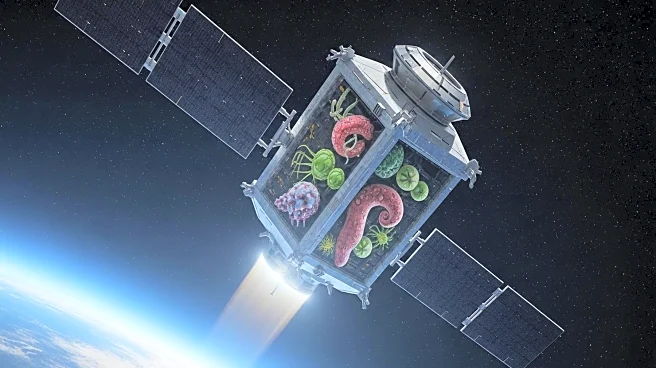What's Happening?
The Russian Bion-M No. 2 satellite, dubbed 'Noah's Ark,' has successfully returned to Earth after a 30-day mission in orbit. The satellite carried a diverse array of biological specimens, including 75 mice, over 1,500 flies, cell cultures, microorganisms, and plant seeds. Launched from the Baikonur cosmodrome, the satellite was placed into a polar orbit, exposing its payload to high levels of cosmic radiation. Upon landing in the Orenburg region, recovery crews quickly extinguished a small brush fire and began examining the specimens. The mission, a collaboration between Roscosmos, the Russian Academy of Sciences, and the Institute of Biomedical Problems, aims to study the effects of spaceflight on biological organisms.
Why It's Important?
The Bion-M No. 2 mission provides valuable insights into the impact of space conditions on living organisms, which is crucial for the development of life support technologies for future crewed space missions. Understanding how cosmic radiation and microgravity affect biological systems can inform the design of safer spacecraft and improve radiation protection measures. The research also contributes to the broader scientific understanding of life in the universe, exploring the potential for microorganisms to survive space travel and reentry, which has implications for theories like panspermia.
What's Next?
Post-flight studies are underway, with specimens being transported to laboratories for detailed analysis. The research will focus on assessing the physiological changes in the animals and plants, as well as the potential survival of microbial strains embedded in basalt rocks during reentry. These studies will help refine spaceflight protocols and enhance the safety of future missions. Additionally, the mission's findings may influence international space research collaborations and drive advancements in biotechnology.
Beyond the Headlines
The mission raises ethical considerations regarding the use of animals in space research, highlighting the need for responsible scientific practices. It also underscores the importance of international cooperation in space exploration, as the findings could benefit global efforts to understand and mitigate the challenges of long-duration space travel.










